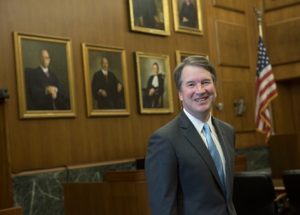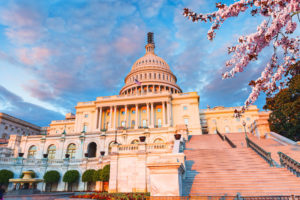
Dr. Christine Blasey Ford and Judge Brett Kavanaugh testify before Congress, FCC rules on 5G wireless networks, and more…
IN THE NEWS
- Dr. Christine Blasey Ford testified before the U.S. Senate Committee on the Judiciary this week about her sexual assault allegation against U.S. Supreme Court nominee Judge Brett Kavanaugh. Meanwhile, three more women have also accused Judge Kavanaugh of sexual misconduct. One of those women, Julie Swetnick, alleged in a sworn declaration that, in the early 1980s, she was a victim of one of several “‘gang’ or ‘train’ rapes where…Brett Kavanaugh” was “present.” In addition, Deborah Ramirez alleged that Judge Kavanaugh exposed himself to her at a Yale University party. Judge Kavanaugh was also accused of sexual assault in an anonymous letter sent to Senator Cory Gardner (R-Colo.). The Judiciary Committee is slated to vote on Judge Kavanaugh’s nomination today.
- The Federal Communications Commission (FCC) approved a declaratory ruling concerning the construction of infrastructure for 5G wireless networks. The ruling sets the fees municipalities can charge wireless providers for land, and it limits the time for reviewing business proposals. FCC Chairman Ajit Pai praised the ruling, as it helps to avoid situations where local governments could “delay if not prevent the benefits of 5G from reaching American customers.” Commissioner Jessica Rosenworcel, however, described parts of the ruling as “extraordinary federal overreach,” as it removes local governments from the 5G development process.
- The Board of Governors of the Federal Reserve System raised interest rates, which was the third time it did so this year. Federal Reserve Board Chairman Jerome Powell reportedly stated that the increase would help to “sustain this strong economy,” but President Donald J. Trump reportedly said that he was “not happy” about the increase. The Federal Reserve also released an update for predicted annual economic growth, which exceeded its most recent growth prediction in June.
- The U.S. Department of Transportation’s Pipeline and Hazardous Materials Safety Administration (PHMSA) rescinded part of a rule that requires trains carrying crude oil to use a special brake system. The rule required electronically controlled pneumatic brakes, as well as various other safety upgrades to tank cars. The PHMSA stated that the decision was based on its finding that the costs of installing these brakes “would be significantly higher than the expected benefits of the requirement.”
- In a 393-13 vote, the U.S. House of Representatives passed the Federal Aviation Administration Reauthorization Act, which would require, among other items, that the Federal Aviation Administration set minimum requirements for seat width and space between seats. Representative Steve Cohen (D-Tenn.) stated that “tightly cramped seating on aircraft is a safety issue” that “will now be taken seriously.” But Paul Hudson, president of Flyers Rights, reportedly expressed his concern that the FAA could simply “reiterate” its stance that current seating configurations are safe. The U.S. Senate is expected to vote on the legislation this month.
- U.S. Senators Jon Tester (D-Mont.) and Ron Wyden (D-Ore.) introduced a Congressional Review Act (CRA) resolution that would invalidate an Internal Revenue Service (IRS) guidance document, which allowed some tax-exempt organizations to not disclose the names of their donors. “We must crack down on the dark money flooding our political system,” Tester said. “We cannot allow special interests to hide in the darkness,” he insisted. In July, Wyden and Senator Jeff Merkley (D-Ore.) introduced the Spotlight Act, which would require non-profits that engage in political activity to disclose the names of their donors to both the IRS and the public.
- The U.S. Environmental Protection Agency (EPA) proposed a rule that would require government contractors that perform scientific activities for the agency to follow EPA’s Scientific Integrity Policy. The policy requires agency employees to perform scientific work of the “highest quality,” “ensure impartiality,” and “welcome differing views and opinions on scientific and technical matters as a legitimate and necessary part of the scientific process.” EPA will accept public comments on the proposed rule until November 26.
- The New Jersey Division of Alcohol Beverage Control (ABC) updated rules for microbreweries in a special ruling that has already sparked heated debate. David P. Rible, ABC’s director, stated that the updated rules “balance the concerns and interests of the entire industry” including traditional bars and alcohol retailers. In response, brewery advocates circulated a petition characterizing the ruling as an “unwarranted economic hardship” that “needlessly undermines the continued growth of the microbrewery industry,” which has gained more than 18,000 signatures to date.
- The National Football League (NFL) called for federal regulations governing sports betting, noting that “the federal government has primary authority” on interstate commerce. Among other requests, the NFL requested federal legislation that would require sports betting venues to use “official league data.” Sara Slane, Senior Vice President of the American Gaming Association, testified that “states and tribes have proven to be effective gaming regulators” and that sports betting should be similarly regulated.
WHAT WE’RE READING THIS WEEK
- In a forthcoming article for the Washington Law Review, Jennifer J. Lee of the Temple University James E. Beasley School of Law and Annie Smith of the University of Arkansas School of Law discussed regulatory strategies at the state and local level for preventing wage theft. Lee and Smith examined 130 regulations and noted multiple promising strategies: “hold high-risk employers accountable before wage theft happens”; “expand the way in which agencies learn about problems”; and increase educational outreach to employers and workers. Lee and Smith also suggested that “nongovernmental solutions” may be most effective in areas where regulatory reform is less likely.
- In an article for the Lewis & Clark Law School Animal Law Review, Ann Schiavone of Duquesne University School of Law argued against breed-specific legislation—bans on the ownership of specific dog breeds—as a way to prevent dog bites. Breed-specific legislation, she stated, does not address the underlying owner-caused risk factors of dog aggression. Instead, Schiavone advocated for “enacting laws that regulate the real but minor risk of severe injury from dog bites” that do not discriminate by breed.
- The Trump Administration’s repeal of an Obama-era regulation of methane leaks on federal and tribal land “illustrates the balance between the three branches of government,” wrote Stuart Shapiro of the Bloustein School at Rutgers University in a column for The Hill. Shapiro noted that the Republican Party could undo the Obama-era regulations neither through a CRA resolution in Congress nor through a delay by the executive branch that was halted in court. Shapiro observed that now that the Bureau of Land Management has issued a rule repealing the Obama-era regulations, the judicial branch will decide the fate of the repeal.



